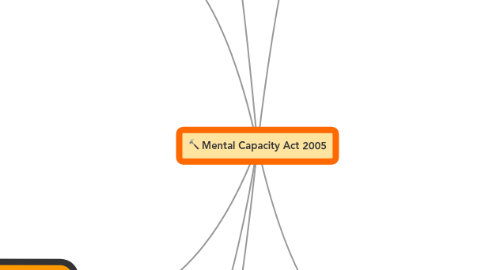
1. Section 9 - 14: Lasting Powers of Attorney
1.1. Clear statutory procedures for donor and donee
1.2. Powers may be granted to one or more legal persons
1.3. S 11- Clear statement of restrictions
1.4. S12 Gifts
1.5. S13 - Revocation
1.6. S14 - Protections for donee and others
2. Section 4. Best Interests
2.1. Must consider
2.1.1. S 4(3)
2.1.1.1. (a)whether it is likely that the person will at some time have capacity in relation to the matter in question, and
2.1.1.2. (b) if it appears likely that he will, when that is likely to be.
2.1.2. S4(6)
2.1.2.1. (a) the person's past and present wishes and feelings (and, in particular, any relevant written statement made by him when he had capacity),
2.1.2.2. (b) the beliefs and values that would be likely to influence his decision if he had capacity, and
2.1.2.3. (c) the other factors that he would be likely to consider if he were able to do so.
2.2. Take into account
2.2.1. (a) anyone named by the person as someone to be consulted on the matter in question or on matters of that kind,
2.2.2. (b) anyone engaged in caring for the person or interested in his welfare,
2.2.3. (c) any donee of a lasting power of attorney granted by the person, and
2.2.4. (d) any deputy appointed for the person by the court,
2.3. S4(4)Must act
2.3.1. so far as reasonably practicable, permit and encourage the person to participate, or to improve his ability to participate, as fully as possible in any act done for him and any decision affecting him.
2.4. S4(5) Prohibition
2.4.1. Where the determination relates to life-sustaining treatment he must not, in considering whether the treatment is in the best interests of the person concerned, be motivated by a desire to bring about his death.
3. Section 3: Inability to make decisions
3.1. Inability if unable -
3.1.1. [3(1)a] to understand the information relevant to the decision
3.1.2. [3(1)b] to retain that information
3.1.3. [3(1)c] to use or weigh that information as part of the process of making the decision, or
3.1.4. [3(1)d] to communicate his decision by any means
3.2. Ability to understand
3.2.1. [3(2)] will exist if person can understand the information relevant to a decision if it is presented in a way that is appropriate to circumstances
3.3. Retention
3.3.1. [3(3)] - retaining relevant information for a short period does not negate person being regarded as capable of the decision
4. Section 2: People who lack capacity
5. Section 1: The principles
5.1. persons assumed to have capacity unless it is established that there is a lack of capacity
5.2. person not to be treated as unable to make a decision unless all practicable steps to help him to do so have been taken without success.
5.3. person is not to be treated as unable to make a decision merely because he makes an unwise decision.
5.4. An act done, or decision made, under this Act for or on behalf of a person who lacks capacity must be done, or made, in his best interests.
5.5. Before the act is done, or the decision is made, regard must be had to whether the purpose for which it is needed can be as effectively achieved in a way that is less restrictive of the person's rights and freedom of action.
6. Overview
6.1. Full text
6.1.1. HMSO
6.1.2. Explanatory Notes
6.2. A new Court of Protection
6.2.1. to make new substitute decision-makers ('deputies').
6.3. The Act replaces all of Part 7 of the MHA 1983
6.4. Replaces all of the Enduring Powers of Attorney Act 1985
6.4.1. new statutory scheme for "lasting" powers of attorney which may extend to personal welfare (including health care) matters
6.5. Checklist for determining best interests
6.6. Liability for actions in connection with care of persons without capacity
6.7. sets out rules about advance decisions to refuse medical treatment
6.8. new safeguards controlling many types of research involving people who lack capacity.
7. Key features
7.1. Part 1 People who lack capacity
7.1.1. Principles
7.1.2. Preliminary
7.1.2.1. People who lack capacity
7.1.2.2. Inability to make decisions
7.1.2.3. Best interests
7.1.2.4. Acts in connection with care or treatment
7.1.2.5. Section 5 acts: limitations
7.1.2.6. Payment for necessary goods and services
7.1.2.7. Expenditure
7.1.3. Lasting powers of attorney
7.1.4. General powers of the court and appointment of deputies
7.1.5. Powers of the court in relation to lasting powers of attorney
7.1.6. Advance decisions to refuse treatment
7.1.7. Excluded decisions
7.1.8. Research
7.1.9. Independent mental capacity advocate service
7.1.10. Miscellaneous and supplementary
7.1.10.1. codes of practice
7.2. Part 2 Court of Protection and the Public Guardian
7.2.1. The Court of Protection
7.2.2. Supplementary powers
7.2.3. Practice and Procedure
7.2.4. Fees and Costs
7.2.5. The Public Guardian
7.2.6. Court of protection visitors
